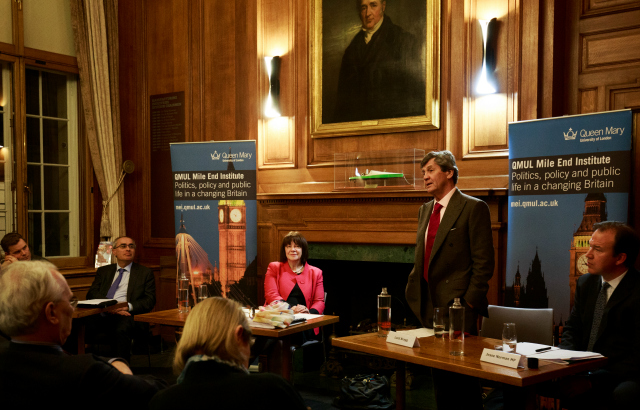Mile End Institute and the BBC co-host debate on the future of the Royal Charter
There is a danger of “living in cloud cuckoo land” when it comes to the competitive pressures facing the BBC, according to Jesse Norman MP, Chairman of the Culture, Media and Sport Select Committee.

“The licence fee is under real pressure. You’ve got a relatively high cost institution, obeying very high quality standards, and you’ve got a licence fee settlement which is premised on people behaving in ways that they are almost certain not to behave in over the next ten years. There is a real challenge: how to reduce costs but make the BBC more resilient.”
Mr Norman joined an expert panel on Monday 29 February that included barrister Lord (David) Pannick, academic Dr Martin Moore, and broadcaster Lord (Melvyn) Bragg to consider the question of the BBC’s Royal Charter, funding, and independence. The panel debated a range of issues including the future of the BBC Trust, and was co-hosted by the BBC and the Mile End Institute, Queen Mary University of London.
Speaking to an audience that included Tony Hall, Director-General of the BBC, and former Cabinet Secretary Lord (Gus) O’Donnell, Mr Norman addressed directly the question of whether the BBC would be better served by statutory regulation in place of its current Royal Charter. He said that his Committee was open to the idea of statutory legislation but cautioned that those advocating such a shift “should be careful what you wish for”.
“Is legislation really such a good idea? Let’s not forget that a Charter is, in a sense, less political. Yes it gives the Executive more discretion…but the issue is not being kicked around the floor of the House of Commons in a way that definitely would politicise much discussion about the BBC, so I think it has some advantages.”
David Pannick QC, Barrister and Crossbench Peer, disagreed, describing the Charter as an “anomaly” and a “historical accident”.
“A Royal Charter has very substantial disadvantages for the BBC and the public. It has very considerable advantages for Ministers, compared with legislation. Ministers enjoy the ability to define the contents of each Royal Charter free from parliamentary control and public scrutiny.
“It’s right of course that there is a danger for the BBC in statutory regulation – Parliament may produce an unsatisfactory regulatory scheme. My advice to the BBC is that it would be far better to arrive at a principled, coherent, statutory scheme – which sets out the relevant principles as to the function of the BBC, the scope of its services, its independence, and it’s funding.”
In an impassioned defence of the BBC, broadcaster and Labour peer Melvyn Bragg said that the licence fee should be increased.
“We live in a country which is fearful of losing its identity. A thousand years ago there was a debate on what was called the matter of Britain. It’s come around again, as these things do, especially in an island with profoundly rich traditions and a persistent need to re-examine itself. It’s not too much to ask, what is the matter of Britain now?
“In my view the BBC above all – more than the monarchy, more than Westminster, more than Whitehall, represents and is able most clearly to define the matter of this troubled, inventive, extraordinary immigrant country. We cannot afford to see it weaken.”
More information
- The event took place at 6.30pm, Institute of Mechanical Engineers, One Birdcage Walk, SW1H 9JJ
- The full recording of the event is available here
Related items

25 June 2025

24 June 2025
For media information, contact:
